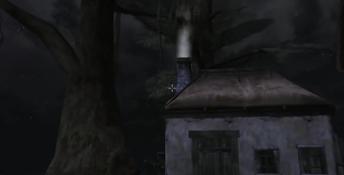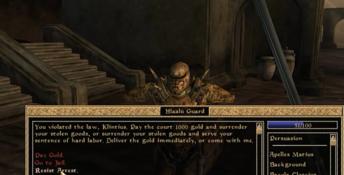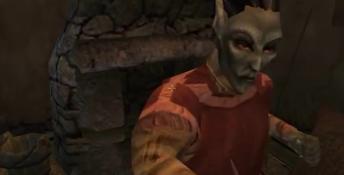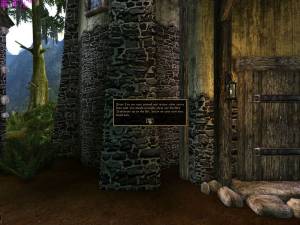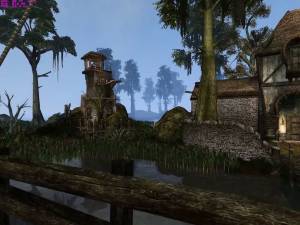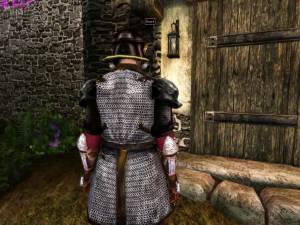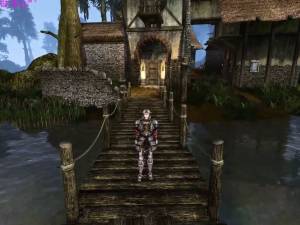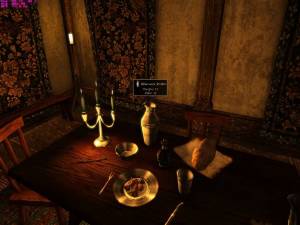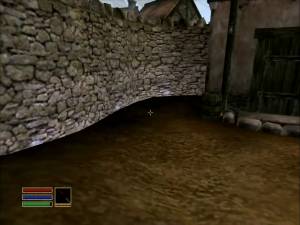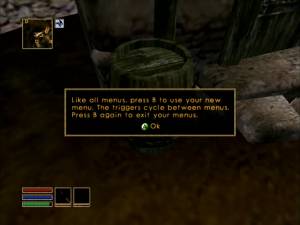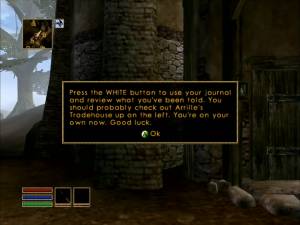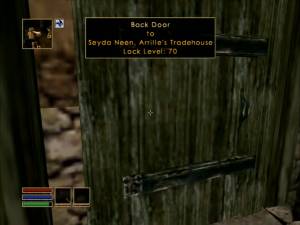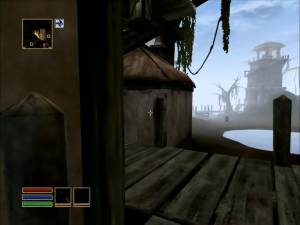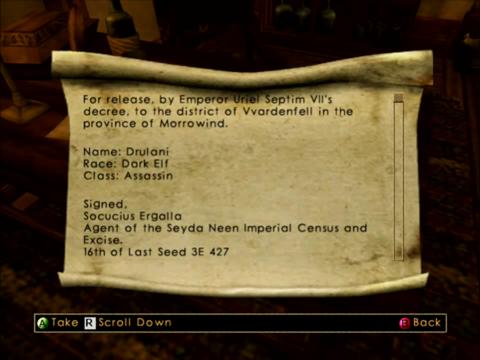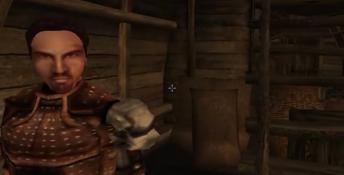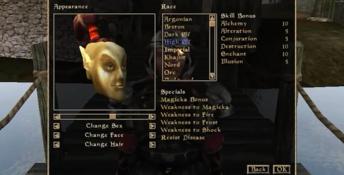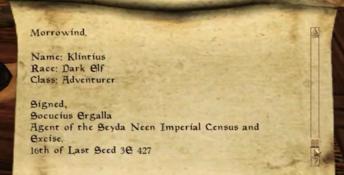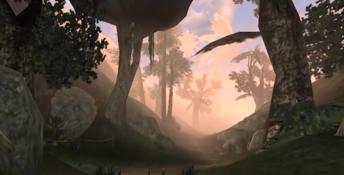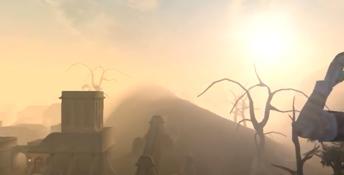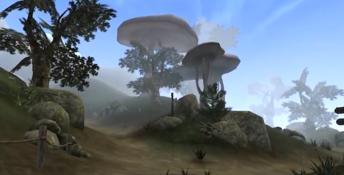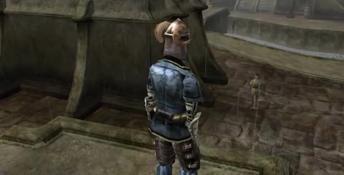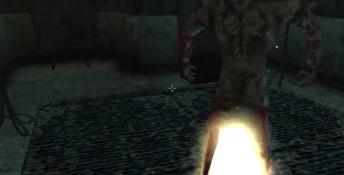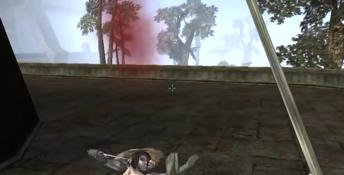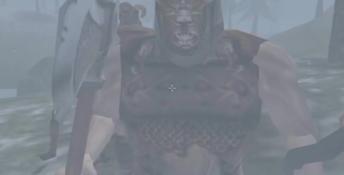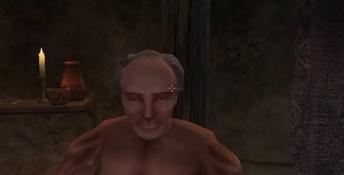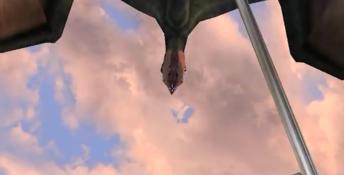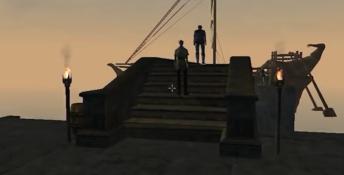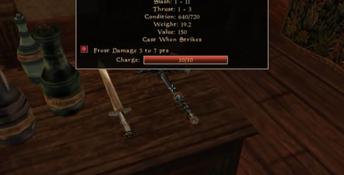The Elder Scrolls III: Morrowind
| a game by | Bethesda Softworks |
| Platforms: | XBox, PC |
| Editor Rating: | 8/10, based on 2 reviews, 10 reviews are shown |
| User Rating: | 8.0/10 - 11 votes |
| Rate this game: | |
| See also: | Retro Games, Adventure Games, Elder Scrolls Series, Games Like Star Wars: KOTOR |
Right then, before we start let’s make one thing perfectly clear: if you think this is going to be just another first-person RPG with bug-eyed goblins, bleak dungeons and peculiarly named Elven kings, think again. Morrowind is about as far removed from your regular RPG as you can possibly get. It features so many different character classes and races we felt dizzy just scrolling through the list. There are also around 27 specialist skills to master, and that’s not including the stacks of scrolls and spells. Frankly, the scope for both character creation and advancement is RPG heaven, but then we shouldn’t really be surprised when Ken Rolston, designer of classic pen-and-paper RPG adventures for the likes of Paranoia and Warhammer is Morrowind's lead designer.
And in time-honoured pen-and-paper fashion, Morrowind will also be totally non-linear. But we don’t just mean Baldur’s Gate-style non-linear where you have a certain amount of choice as to what order you complete the quests in.
No, no, no. We are talking proper nonlinear, in so far as you can attempt whatever quest you like, at whatever point you desire. That is if you even want to do the quests at all...
What Quests?
The beauty of this RPG is that you have a choice. The main story contains dozens of missions and around 100 hours of game time. If, however, that sounds too restrictive for you, you can break free from the shackles of the plot and embark on your own freeform adventure into the unknown and return to the main story whenever you like.
Morrowind lets you roam free across ten square miles of land allowing you to live your life how you see fit. If you want to survive as a hermit in a forest gathering berries to sell at a local market, then you can. If you want to be a mercenary fighting for some dubious political cause, you can. If you want to be an assassin, mage, thief or even drug dealer then go right ahead and do your worst. Morrowind offers a near infinite amount of possibilities in a world teeming with opportunity. What we have here could well be the Elite of fantasy RPGs.
It’s also worth bearing in mind that everything you do affects the world in some way, especially when it comes to interacting with other humans, orcs, or whatever. There are 2,000 NPCs spread across 30 towns who react to you depending on whether or not they like you.
For example, if you upset or even kill somebody of a particular guild or faction, their peers are unlikely to greet you with a warm, toothless smile and a pint of Dragon Froth. Accordingly, if you try and ask them about anything, whether it’s directions to the local herbalist or important quest information they’ll simply snub you, or worse, decapitate you. Of course, you could always resort to threats if you're skilled in the art of intimidation...
Down To The Lake I Fear
And then there are the graphics. Traditionally RPG graphics engines blow chunks, and very big chunks at that. Deus Ex pioneered a change in that department a year or so ago, but Bethesda has now taken the standard to a whole new level. The sheer quality, beauty and variety of the landscape as well as everything in it puts a lot of first-person shooters to shame. As project leader Todd Howard says: "When we started this project three years ago we were very tired of the way RPGs looked. After all, why shouldn’t an RPG look as good as anything else out there?"
Who are we to argue? Using a dramatically modified version of the Net Immerse engine, Morrowind is completely compatible with the GeForce 4 graphics card, and full use has been made of its fabled pixel shading. When you step into water you don’t just get an animated splash; you get proper waves that emanate outwards from your location. And when it rains on a lake, the entire surface is covered with little pockmarks and ripples. There’s no doubt about it, witnessing it is one of those seminal gaming moments you never forget.
Of course, not everyone's going to have the luxury of an expensive GeForce 4 card, and the good news is there’s plenty to see without one. Most notable is the real-time weather system, including moving clouds and sandstorms. There’s also a full ntght/day cycle complete with spectacular sunrises and sunsets, an idea that apparently came about after a transatlantic flight to the UK. Inspiration can strike in the strangest of places it seems.
Doing It My Way
One thing Morrowind won't support is the ability to assemble a party. There are certain quests where somebody might tag along with you for a while and there's even a mage’s quest where some NPC workers help you build a tower. Generally speaking though you're on your own. It's also a single-player only game, so you can forget co-op play on the Internet or LAN.
Obviously this means that once you’ve selected your character class at the start of the game you have to operate within the bounds of that character. A thief will never have the fighting prowess of a dedicated warrior for instance, and so you'd be wise to avoid situations involving combat. Indeed, the typical thief will spend most of their time hopping from rooftop to rooftop looking for potential pickpocketing prey and doing the odd bit off backstabbing should the opportunity present itself. A well-played thief would never find himself (or herself) in a battle situation anyway.
Pure Class
The variety of playing styles is the very crux on which the whole game rests. Thieves actually earn experience and ultimately levels for performing their clandestine tactics; gaining experience by simply killing things just doesn't happen in Morrowind - the whole system is much subtler than that.
"Classes are a combination of skills," explains Howard. "You don’t raise levels by experience points, you raise them by using skills that are important to your class." In other words whenever a thief employs stealth skills he'll be vigorously rewarded for it.
Warriors will of course find their skills improving as they make kills, but it’s more the fact that they are using a particular weapon or employing a certain fighting technique that rewards them rather than the actual act of killing something.
Ultimately such a system means the gameplay should prove to be a purer roleplaying experience than you get in games such as Baldur's Gate, where most of your level and skill increases are gained by violence. OK, occasionally in BG you gain experience by making character-based yes or no decisions, or by casting a spell or finding a trap, but it’s nowhere near the scale of Morrowind.
The Siege Is Set
Despite its strengths Morrowind still has a couple of major hurdles to overcome if it's to do what its illustrious Elder Scrolls predecessors did and scoop a shedload of RPG awards. The first thing it needs is to streamline an interface that, while admittedly unfinished, showed signs of being a handful. Buying and selling in particular caused a fair degree of angst during our afternoon’s playtest. The second and possibly more difficult hurdle comes in the form of Neverwinter Nights - due for release at more or less the same time as Morrowind. Which of these will eventually rise up to be king is difficult to say, but one thing's for sure, 2002 could be quite a year for RPGs.
Download The Elder Scrolls III: Morrowind

System requirements:
- PC compatible
- Operating systems: Windows 10/Windows 8/Windows 7/2000/Vista/WinXP
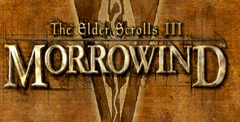
System requirements:
- PC compatible
- Operating systems: Windows 10/Windows 8/Windows 7/2000/Vista/WinXP
Game Reviews
There are so many reasons why this is a must-have package it's difficult to know where to begin. We can start with the fact that Morrowind is one of the best RPG's ever made on any platform, we can talk about its deep interaction, wonderful scenery and revolutionary character development system. Or then again we could mention the fact there are so many mods available for it now that the original game is only the beginning of your adventures and many user-made add-ons await if you still want more. Then of course there's the fact that Tribunal, the first Morrowind expansion, is also included in this package. Tribunal brings a new town, new dungeons and quests (and of course monsters) to the Morrowind experience, and while it's admittedly a little small in scope compared to the original game, it certainly expands the excellent storyline in fine style.
This in itself would make Tribunal a worthy add-on, but the developers also re-worked the journal system to make it much more user friendly, and a new annotatable map and general tweaks to the game engine make the expansion desirable as much from a technical standpoint as for pure gameplay reasons. If, after all this, you are still not convinced this compilation should be at the very top of your RPG shopping list, let's face it, you never will be.
So, you've got your latest RPG installed on your hard drive. You fire it up and start playing. You know what to expect. Kill monsters, gain experience points - kill enough of them and you gain levels. The only thing that makes this one different from the last one is the graphics have changed and it has a new plot.
You may or may not be happy about this, but nine times out of ten this is exactly what you are going to get. It's called working to a successful formula. Game developers don't like veering away from the norm - they know what works and they're not afraid to use it. Online RPGs are more guilty of this than their single-player counterparts, but a general lack of imagination is apparent in the make-up and design of most role-playing games on the PC, and it's about time something changed.
The people to do something about this state of affairs are Bethesda, and the result of their labours is a game called The Elder Scrolls III: Morrowind. There are so many ways in which Morrowind puts the competition to shame that it's difficult to know exactly where to start. The beginning seems as good a place as any.
Precise Persona
At the beginning of the game you need to choose which race and class you are going to play. There are three ways of going about this. The first method is fairly straightforward: pick from a list of predefined classes which specialise in magic or melee or a mixture of both - in other words, standard RPG character selection procedure. The second method is more entertaining: answer a set of questions and the game will generate a character based on your answers. This is not entirely dissimilar to the character generation process in the Ultima series. The third method is a lot more time-consuming, but ultimately the most rewarding and without a shadow of a doubt the best choice if you want to succeed in the game: create a custom class in which you decide which major and minor skills your character will have and whe their miin attributes will be. Asing this option, you can create a character that does all the things you want themib do. this will not make much sense to you the first time yowplay. In fact, choosing arecb to wtiat the lefined class is immAded until you learn and understand different schools of magic do and how the different skills affect you as you explore the game world. I can almost guarantee that once you have played for a while you will start the whole game again from scratch and create a character knowing exactly what skills you want them to be proficient in, and Morrowind's custom character option will give you exactly what you want in every department.
What this effectively means is that once you have created your ideal character, you can play exactly how you want to, and this, more than anything else, puts Morrowind head and shoulders above the rest of the single-player RPG crowd. But this would all be in vain if you had come this far only to be faced with yet another RPG that encourages you to plough through as many monsters as possible and gain levels in time-honoured fashion. Thankfully, Morrowind's character development process is a lot more imaginative and satisfying than that.
The Numbers Game
Character advancement in each skill is entirely dependent on how often you use it. Use bladed weapons constantly and your skill will go up accordingly. Use spells from the school of destructive magic and your skill in this school of spells will raise over time. Dungeon Siege has a similar character advancement system, but whereas in Dungeon Siege there are only four areas in which you can specialise, in Morrowind everything you do raises skill in this way. Repair your armour between battles and watch your armour skill go up. even running will increase your athletics skill. It's such a simple concept, but an excellent one. Instead of mindlessly bashing things in the head to go up a level, you will only reach the next one when you have accumulated ten new skill points. As long as ten of your major or minor skills go up fit doesn't matter which ones) you will advance a level.
The wonderful thing about this method of character development is you are rewarded with levels through doing the things you like to do most. Additionally, if you are in a hurry to go up in level (or you just want to get better at a particular skill and don't want to do it through practical use) you can pay a trainer to advance you in whichever skill they specialise in. What this all boils down to is you spend less time doing things just to 'level up' and instead just get on with playing the game, safe in the knowledge that your important skills are being developed as you play. It's the most rewarding and satisfying character development system we have seen in any RPG since Ultima Online, and that's saying something. And it gets better still...
Land Of Opportunity
While you start the game with no faction alignment you will quickly discover there are a whole host of guilds and factions who are more than ready to employ your services and reward you as you advance through their ranks. You can join any of the guilds in Morrowind - the mage, fighter and thief guilds being the obvious choice for specialist classes, but there are a host of other guilds too. Each one will give you simple tasks to start with and then send you on more challenging missions as you rise in level, obviously with much higher rewards for successful completion of the tasks you have been set. This is typical of the totally open-ended nature of the game. You are not forced down a set path at any point in time. There is a main quest, and you can see this through to the end and complete the game if that's your thing.
But if you do just stick to this path, you will miss much of what Morrowind has to offer. The plot is hugely intriguing and twist-ridden, one which is so compelling you'll feel totally immersed in it. Rumours that an evil Nerevarine (dark elf) cult is gaining influence throughout the land abound, and it's up to you to find out why and how to stop it. I don't want to give too much away, but believe me, it's a thrilling ride.
Just exploring the breathtaking landscape is a joy in itself (Morrowind sports the best graphics of any RPG to date) and there are so many characters to interact with, many of whom will give you detailed information on places and events, you will want to explore every part of the gaming world before making any serious headway into the main quest. It's the sort of game you just don't want to finish because you know that when you do there will be nothing of even vaguely similar quality to occupy your time when you do. Yes, it is that good. There are so many different things to do at any one time that you will often have to sit back and take stock of the situation before deciding what to do next, and you can keep track of everything that's happened in an excellent journal which has hyperlinks. These give you detailed information on all the people, places and things you have come across to date. Even when you have finally finished tile main quest and reached the end, you can acquaint yourself with the construction kit that comes with the game. This allows you to make your own adjustments to the game world and play through it again.
It remains to be seen how far people go with this feature, but it's a very powerful tool and the potential is certainly there to expand greatly on the existing game world for those with a little imagination. As it stands, the single-player game currently has no equals in the RPG genre. It's the most accomplished and absorbing title to come our way in a very long time, and if you have even a casual interest in RPGs you owe it to yourself to get your hands on a copy. So go lose yourself in a title which has emerged as a leading contender for game of the year.
Now That Oblivion's out and soaking up so much criticism that it makes squelchy noises when it walks, Morrowind's asking price has come right down to $4.99 - that's about one-third of the price of a ticket to London Zoo if you donate money to the monkeys.
Even if you've already played (or are still playing) Oblivion, its predecessor isn't without its advantages. Look past the dated graphics and pretend sword fighting style and this game remains every bit as expansive and opportunistic as its prettier offspring. A better levelling system, an actual sense of danger when walking in the wilderness, a bigger wilderness and a crab which bought things off you - any Elder Scrolls fan will tell you exactly what Morrowind has over its more widely received successor.
Of course, if you haven't played an Elder Scrolls game, then this little budget bundle of joy is an essential purchase. It might not be the better game, but it's worth far more than $4.99.
Ooh, aren't we controversial? Yes, but constant bickering among the team has left the Vvardenfell lobby victorious. The argument runs thusly: Motrowind is a better game than Oblivion, if only for the things that Bethesda sacrificed in their pursuit of making the latter that bit more action-orientated. Consider that moment three hours into the game when you realise you've covered only a minute fraction of the map - the sheer scope of Moirowind's world is breathtaking even by today's standards. It focused on creating a rich, deep back-story for every faction and race, and its lore and fantastically varied environments were more enjoyable to delve into than Oblivion's. You were also more attached to your character and his role in the story. More practically, the taxi-like Silt Striders were infinitely better for RPG gameplay than the adventure-impeding Fast Travel feature, while the levelling system made you feel like you were actually getting progressively stronger and pushing further into the game's wilderness. The absence of voice-acting allowed characters to move beyond the somewhat restrictive vocal talents of Oblivion's actors. In retrospect, the combat was pretty crap, but hell, we stuck with it regardless, and if that's not a measure of this game's brilliance we don't know what is.
If You've never played The Elder Scrolls II: Daggerfall, consider yourself lucky. It was a sprawling mess full of randomly generated quests that were terminally dull and a huge gameworld that had virtually nothing of interest in it. The one thing that was interesting about Daggerfall however, was that it was hugely ambitious. Bethesda tried to create a huge world that was perfect for random exploration but unfortunately, they failed. They haven't this time. Even from the time I've spent playing the preview code thus far, I can tell you now that Morrowind is so much better than Daggerfall in every way that comparisons between the two are pointless. The concept is the same: a huge gameworld with many NPCs and quests and freedom to explore, but this time round the graphics are beautiful (this is now officially the bestlooking role-playing game ever), the quests are not only well-designed but they play a part in how your role in the game develops, and the character development system is hugely flexible to the point where you can literally design your own class if you put enough time into it.
As you can see from the screenshots here, the game looks absolutely stunning. Gorgeous landscapes appear literally everywhere you go, and every town in the game has its own unique theme with artwork and atmosphere to match. The attention to detail is literally stunning. Of course, it remains to be seen how Morrowind holds up over extended playing periods. I've been playing for two days and haven't even got into the main plot yet because there's so much to see and do everywhere I go, but you can rest assured that the signs are very good indeed that we have a very special game on our hands. If, however, the main theme of the game doesn't grab you, you can always redesign it with the help of the TES Construction Kit.
Anything They Can Do...
Bethesda is planning to give away the tools they used to create Morrowind with the game. Create your own armour designs, mess about with the towns and NPCs, give them new dialogue, make new quests, you name it, you can (probably) do it with the TES design tools. This goes a long way to making up for the fact there is no multiplayer option in the game. With a gameworld as attractive and full of character as this one, you can fully expect people to spend a long time creating their own versions of Morrowind, and of course they'll put them straight up on the Net as soon as they've finished.
The future looks very bright for Morrowind - tune in next issue for a full in-depth review. You know it's going to be good, but how good? Well, you'll just have to wait and see.
Along With hex-based strat 'em ups and those soulless management sims our German cousins seem to adore so much, RPGs used to be one of the ugliest gaming genres around. While the likes of Baldur's Gate and Diablo looked presentable enough in their day, such games were kept grovelling in the shade by the gloriously-lovely likes of Unreal, Half-Life et al. This was the unwritten rule until spring 2002, when PC roleplayers got their first real taste of succulent eye candy with the release of Morrowind, the long-awaited third instalment of Bethesda Softworks' Elder Scrolls series.
Pixel shading, now almost as much a PC gaming staple as WASD keyboard controls, was but a twinkle in some crazy coder's eye until Morrowind amved on the scene, wowing all and sundry with its eyepopping water effects. But the game was to prove far more than a mere visual feast for graphics-starved RPGers. It happened to be one of the most ambitious, wide-ranging titles ever to appear on a home computer, giving you the freedom, as Bethsoft's motto has it, to live another life in another world".
In Umbo
Creating this feeling of liberty was a core part of the previous Elder Scrolls games, Arena and Daggerfall, and it was always going to figure in the series' third title. In fact, as project leader Todd Howard points out, Morrowind was originally planned to be extremely similar to its predecessor. We first came up with the idea around 1996, during Daggerfall's final days. The initial concept was to build on the Daggerfall codebase and do it like that, but in high resolution.'' This was not to be: the project was put on hold while Bethsoft worked on the Elder Scrolls spin-off Redguard, and it was to be three long years until the team returned to the drawing board. We then realised we needed to start from the ground up, continues Howard, building a new game for a new generation of RPG players.
Ken Rolston, Morrowind's lead designer and the man tasked with shaping its story and setting, had come to the company during the game's three-year hiatus. "I inherited the basic idea from (Bethsoft senior developers) Kurt Kuhlmann and Michael Kirkbride, he says. ' Tribunal was the original title, and its basic concept - a culture shaped by its peculiar relationship with its three-gods-who-had-been-mortals -was always at the core of the tone and theme of Morrowind. The game has a strange and alien setting; its people and culture are dark and distinctive. All the other narratives and conflicts grew out of this exotic setting."
All The Small Things
While Howard knew the game had to be huge in scale, he also wanted to fill it with tiny, intricate details at the very lowest of levels. In this respect, the team took their inspiration from the Ultima series. "Ultima VII in particular was a key influence for me, in how open the world could be," Howard recalls. "We wanted to model and manipulate every object in the world: every bowl, every spoon, that kind of stuff.
Realising the magnitude of such a task, the team developed the Morrowind Construction Set, a surprisingly simple editing tool that enabled them to assemble the game world - from the top right down to the smallest of minutiae - at a faster pace. The game just seemed to grow and grow, grins Howard. "We kept honing our toolset so we could manipulate the enormous amount of data we were creating.
With the tools in place, the team could begin crafting the game's world: the gigantic island of Vvardenfell. Naturally, this produced problems of its own. Where do you start, for instance, when you've got to create a continent from scratch? At the design level, the first step was to create regions with distinctive features and themes, like the rock-and-marsh of the south-west coast, and the wide grasslands of the east," says Rolston.
The remarkable part of that creation is at the artist-landscape designer's detail level - the shaping of landscape, the selection of rock texture, the placement of plants, rocks, fungi and flowers. Morrowind also has an exceptional sense of routes and pathfinding; the land forces you away from the straight path, and in doing so it slyly reveals ruins just out of reach on the slopes of a mountain, or a citadel glimpsed from a high prospect. The landscape constantly presents you with new, distant or hard to reach features that suck you into the exploring experience."
A Cast Of Thousands
In addition to a stimulating physical environment, Morrowind required inhabitants, a culture and some form of social framework. Ken Rolston's extensive background in the pen-and-paper RPG industry made him the ideal man to flesh out the world. Sandy Petersen (veteran tabletop RPG author) has always said that the worst pen-and-paper RPG session he'd ever seen was still way better than the best computer RPG play experience, and I agree totally. Nonetheless, the PnP RPGs have provided the universities where us designers have learned the trade of setting and theme development. Morrowind's settings and themes are wide and deep because I learned to appreciate and create those features in my PnP game designs."
The Vvardenfell that Rolston helped to build is populated by 2,500-odd NPCs, plus a raft of ferocious wildlife and demonic deadra. It's also home to several villages, towns and one large city, along with numerous subterranean caves, mines and tombs, each home to someone - or something. It's a location that Rolston remains proud of to this day. I love its sense of place, its other-worldliness. That sense is present in the landscape, the architecture, the clothing, the religions, the Great Houses and the individual themes and stories of the characters."
Weird Gaff
Indeed, one of the things that strikes you about Morrowind is the oddness and peculiarity of its setting; it has all the ingredients of a familiar, generic fantasy world - elves, dwarves, monsters, swords and sorcery - and yet doesn't feel familiar or generic. This was Rolston's intention: From Glorantha (PnP RPG), I took inspiration from a resolutely nothing-like-Tolkien set of cultural and religious conflicts in the fantasy setting. And then from LARP (live action roleplay) game design, I took the fundamental underpinnings of social, religious and political faction conflicts that give depth to the stories and characters in Morrowind."
We're always trying to create that PnP experience with the Elder Scrolls," adds Todd Howard. So Ken was instrumental in how we set up and executed this freeform game where you could really roleplay, while also being challenged and entertained. He's brilliant and insane at the same time.
Nod Nod, Wink Wink
Bearing in mind that final comment, one suspects that Rolston may have been behind some of Morrowind's quirkier aspects. The man himself remains tight-lipped when it comes to this subject. There's a wealthy, alcoholic talking mudcrab in the islands on the south-east coast. What's more, many people have savoured the whimsical allusion to Icarus that plunges from the skies and crashes to the ground in front of you. I absolutely forbid our designers to allow any humorous nonsense like that into the final version of the game, he says with a wry smile. I have no idea how it got past my ever-vigilant editorial delete key."
While Ken Rolston was instrumental in providing the themes and backgrounds, the visual side of things was Todd Howard's domain. I hold Todd completely responsible for our pioneering forays into cutting-edge visuals, attests Rolston. "I would have been content to make evolutionary advances in the genre, focusing on content, setting and theme, character, plot and exploration. Todd wanted revolutionary advances in graphics and revolutionary advances in console design and interface. We designers were the lucky ones, working mostly with familiar narrative technologies. Todd and the artists and programmers were marching courageously into the unknown. Combine our ambitions to achieve new levels of graphical splendour m with our ambitions to make the 'Biggest Game Of All Time', and we E were confronting terrible risks. The H team successfully managed those W risks, bringing Morrowind in at the E exact sweet spot of achievable "graphic distinction.
Getting it right was very important to me, Howard adds. I'm the graphics whore and SBiw Ken is the text whore, and Bgus think that Morrowind really represented a coming together of those two disciplines. In this day and age most of the audience is enticed by sexy graphics, but they stay for the deep gameplay.
The Smell Of Success
Enticed the gamers were, and stay they did. Morrowind was a huge commercial success upon its release, both on PC and, somewhat surprisingly for Howard, on Xbox. I thought it would be successful, but I think I underestimated how many people wanted a game like that and how long it would be successful. I really underestimated how popular it would be on Xbox.
Ken Rolston was less shocked by the enthusiastic response. "I have very serious ego needs," he chuckles. "I've also had many satisfying, successful designs in the past. So it would have killed me if it hadn't been a success.
Morrowind also garnered a warm reaction from the gaming press, who heaped praise on its visuals, scope and freeform gameplay style; we gave it a stellar 94 per cent in issue 116. But not everyone loved it. A quick scout online reveals a slew of recurring criticisms: a lack of direction; too slow-paced; characters that were impassive and dull.
The perceived lack of direction can be put down to Morrowind's open-endedness (a big plus in most reviewers' and fans' eyes). The pacing depends on personal preference, but Howard agrees there's some truth in the third point.
If I could go back, I'd spend more time on the dialogue and general characters in the game to add more life -they do feel very stale, he admits. I know it's a desolate world, but at times it came across as too lifeless. It seems that Bethsoft is spending a lot of time ensuring that such a criticism won't be levelled at Morrowind's follow-up, the forthcoming Elder Scrolls IV: Oblivion (see The Future', opposite page).
Following its release, Morrowind's lifespan was bolstered by two successful expansions, Tribunal and Bloodmoon, not to mention Bethsoft's decision to ship the Construction Set -the selfsame toolset that had been so invaluable during development - with the finished product. This gave fans the means to build and modify content for the game.
The number of plug-ins created and downloaded is staggering, says Howard. I think the big fan site is over five million downloads and growing rapidly. That's a big number. One of my favourites was created by Brian Robb; you can run around, do Matrix-style combat and lop people's heads off. We eventually hired him full-time.
Individual And Proud
Despite Morrowind's resounding success, there have been very few imitators or even strongly influenced titles released since. Ken Rolston believes he knows why. It's just too difficult. MMORPGs can provide vast landscapes and epic scope, but they lack the narrative depth to make those settings more than entertaining loot-and-advancement treadmills. Singleplayer games can spend more energy on character and story, but they generally don't have the time or resources to build such wide and deep settings."
In fact, it's likely that in this 30-centric age of games development, no company will ever again attempt to create a game offering such breadth and freedom as Morrowind. Even Bethsoft seems to be narrowing the scope or altering the focus with Oblivion, which will feature less NPCs and fewer quests, with much of the emphasis on recreating convincing emotions and reactions in the game's inhabitants rather than on building the largest world possible.
So Morrowind may well turn out to be one of a kind, which suits its creators. I loved it," says Rolston. For all its flaws and blemishes, it's a classic monster whose like shall never be seen again. It was too big, too grand In conception, too overwhelming in scope to ever be produced. It was a miracle. And sometimes, thankfully for the game's legions of fans, miracles do happen.
Living In Oblivion
While we may not see other developers working on Morrowind-esque titles, Bethsoft is currently working on its follow-up, The Elder Scrolls IV: Oblivion. Currently scheduled to appear before the end of the year, Oblivion is set in another part of the Elder Scrolls world - the Imperial capital, no less - and its plot revolves around the assassination of the Emperor and the opening of a portal to Oblivion, a hellish underworld populated by legions of demonic nasties.
If the screenshots are any indication, we're in for another visual feast, while Bethsoft is promising to inject far more life into the realm's inhabitants. Improved Al gives the NPCs daily cycles, needs and desires, while combat will be far more visceral and dynamic than that of Morrowind. Gameplaywise, you can expect another freeform approach, giving you the opportunity to again join various different factions or simply do your own thing and ignore the main quest. We can't wait.
The mother lode has been struck, and you, my fellow RPG lover, are about to become wealthy. Elder Scrolls III: Morrowind has been unleashed on a very deserving people and if you've got the mettle, then I have got arguably one of the finest RPGs ever made.
Morrowind is a classic RPG with uncommon realism and staggering replay ability. A single player game that is viewed in the first person, Morrowind has you select what race, class, birth sign (yes, it affects the game) along with attributes and skills that let you know you are in for a long, long ride.
Once the game begins and you have created your character, it's off you go, into a massive gaming environment that breaks all the rules of traditional RPGs. Do you choose to start your quest, or do you choose to start robbing people and drinking in the local bar? Will you travel the main road, or prowl through the forest in search of villains and their treasure. The game's choices are literally endless and you could arguably play for as little as 100 hours or for as many as 300, maybe even more! Yes, this is the closest thing to an alternate reality I have ever had the pleasure of playing. What makes it even scarier is the game also includes a construction set to make your own quests. But let the numbers do the talking:
- Over 3200 NPC in the game.
- 316,042 hand placed object found in the game.
- More then 300 dungeons to explore and conquer.
- Over 480 Billion different character you can create and play as.
This game IS the game to play, but only for serious RPG players. Casual players and peasants will get the holy living bejeebers slapped out of them. The challenge has been issued, do you dare venture forth?
As an RPG lover, I have been waiting for this game to arrive on the XBOX for months. At last, I have finally got my hands on Morrowind. Questions raced through my mind, can this game possibly live up to all the hype, will it be buggy, and could we finally have a decent RPG out on the XBOX? Let me tell you what I found.
Morrowind is a hugely ambitious game. Everything about it makes us RPGers salivate: non-linear game play, huge variety of character classes, countless NPCs to interact with, completely immersive interactive environments, an engaging plotline, as well as a seemingly endless number of quests, dungeons and lands to explore. You have complete control over whom your character will be which is where the replay value really shines. You can choose to be play a good character, helping those around you in need, or you can play as a self-seeking rogue looking to enhance his wealth and power, stealing items when others aren't looking. It's your decision. It's your life.
This could be the last game you need to buy for the year! After playing only the first several hours, I began to realize how detailed this world really was. I stumbled across a murdered tax collector (pocketed the taxes, that he no longer needed), helped bring the murder to justice at the end of my sword, assisted a guard to locate the hiding place of a stash of treasure and by then I was hooked, totally immersed in the world of Morrowind. From this point on, you only go in deeper.
I will continue to log some serious hours into this game. This game is fantastic in its detail and depth. While I love this, the level of depth may also be a discouraging factor to anyone who isn't a die-hard fan of this genre. To play this game right, you will need to interrogate the citizens of this world, join some guilds and make contacts and develop relationships with key players in each town, follows clues and wherever possibly continue to develop your skills and gain wealth. This game is not just about hacking and slashing monsters, although there is a lot of that, you have to strategize and plan your moves carefully. Above all else, save frequently! Be prepared to take some time just getting to know the controls and familiarize yourself with the world, in the starting town. There is no time limit so take your time and when you are ready, then move on to the next town, because this is when the action picks up and the real game play starts to shine, and there goes any free time you once had.
The first Xbox RPG has finally arrived, and it's a doozy. Forget what you know about console role-playing games--Morrowind changes everything. This PC interloper invades the realm of console gaming with a style of play that bears little resemblance to that of Japanese RPGs like Final Fantasy and Dragon Warrior. You won't find any spiky-haired youths, turn-based battles or linear, one-truck storylines here. In this game, it's just you, alone in a massive fantasy world with complete freedom to do as you choose. You determine every aspect of your hero's appearance, attributes and abilities. If you're unhappy with the available character-class options, well then design your own custom class. When you want to take a break from the main storyline, embark on one of over 400 optional quests. These miscellaneous tasks will score you lots of cool items and status aides.
But sometimes you might need a respite from questing altogether. Try some sightseeing. The world of Vvardenfell provides excellent hiking grounds with 10 square miles of terrain to explore. Or maybe you're not cut out to be a heroic do-gooder. If that's the case, start systematically slaughtering townsfolk and stealing all their loot. It's all up to you, and the adventure could literally go on for months.
People say:
I'm not sure if you guys are ready for this one. I've played nearly every console RPG from the past 20 years, a few PC quests and even a multi-year live-action D&D campaign (did I just admit that?), and I was still overwhelmed by the enormous scope of Morrowind. This game thrusts you into a complex, living world that's also a bit daunting. Following the tenuous main quest can be tricky, as optional side-quests constantly lure you away from the path. It's all so open-ended and freeform that you can easily get lost in the world and forget about the "game" proper. It's enough to make your head swim, which is itself pretty impressive (and scary). At least all of this monumental adventuring looks fabulous. Traditional swamps, forests and plains look great, and the more creative areas will astound you. Exploring a Venetian-style canal town or a city filled with insectoid buildings is simply awe-inspiring. If only the gameplay could match the quality of the visuals. To put it simply, Morrowind's battle system sucks. It's slow, clunky, vague and boring. Luckily, combat isn't too terribly frequent, so the game's not completely ruined. Even so, I do think Morrowind deserves a caveat--it's so dauntingly huge that the average gamer might not have the fortitude to stick with it through the first day, much less its entirety. However, for a certain type of player...say, a bored dude with no summer job, it's a fabulous time-waster.
Holy hell, am I exhausted. Morrowind's easily the biggest, most hardcore behemoth of an RPG I've ever played. It's so open-ended that you actually feel lost right from your babe-in-the-woods beginning. Once I learned that grilling every villager for info was the key to getting jobs, joining guilds and political factions, eventually establishing an identity and reputation for myself, things came a lot more easily. But between the awkward PC-RPG combat, having to cover a veritable Nebraska of ground to complete even small jobs, and trying to absorb alt the prattling of the townsfolk, I can't imagine anyone but the hardest of hardcore appreciating Morrowind.
This is as close as a console RPG has come to pen-and-paper games like D&D: deep, non-linear and H-U-G-E, with more characters, towns and dungeons than you can imagine (all that's missing is the dice and Mountain Dew). It's way too much to go into here, and honestly at times it's overwhelming--the intricacies for the (very cool) abilities to make your own spells and magic items alone could fill a book. Combat isn't so hot, and you spend way, way too much time reading the same text talking to people. But if you have the time and are wilting to commit to a seriously in-depth RPG (Final Fantasy it ain't), the freedom Morrowind allows will astound you.
Snapshots and Media
PC Screenshots
See Also
 Earth and Beyond
Earth and Beyond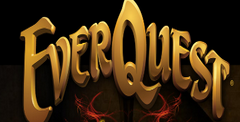 EverQuest
EverQuest
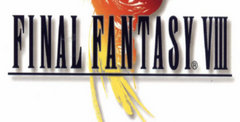 Final Fantasy VIII
Final Fantasy VIII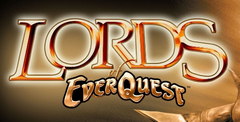 Lords of EverQuest
Lords of EverQuest
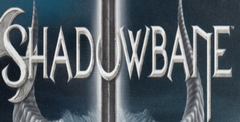 Shadowbane
Shadowbane
 Phantasy Star Online
Phantasy Star Online
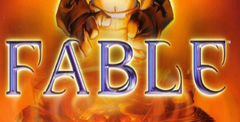 Fable
Fable
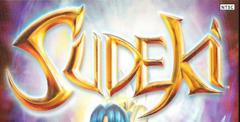 Sudeki
Sudeki
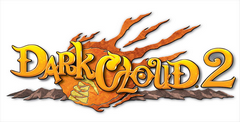 Dark Cloud 2
Dark Cloud 2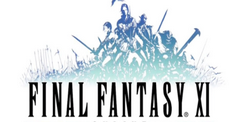 Final Fantasy XI
Final Fantasy XI
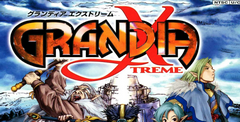 Grandia Xtreme
Grandia Xtreme
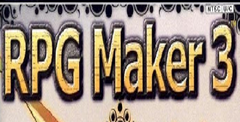 RPG Maker 3
RPG Maker 3
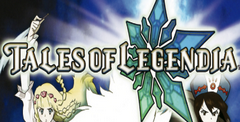 Tales of Legendia
Tales of Legendia
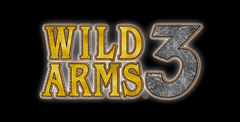 Wild Arms 3
Wild Arms 3
 Ys: The Ark of Napishtim
Ys: The Ark of Napishtim
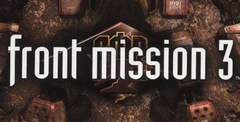 Front Mission 3
Front Mission 3
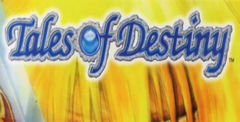 Tales Of Destiny
Tales Of Destiny
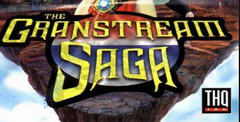 The Granstream Saga
The Granstream Saga
 Xenogears
Xenogears Enchanted Arms
Enchanted Arms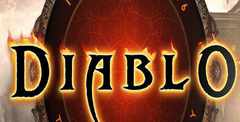 Diablo
Diablo Diablo II
Diablo II
 Diablo: Hellfire
Diablo: Hellfire
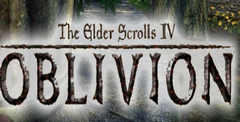 The Elder Scrolls IV: Oblivion
The Elder Scrolls IV: Oblivion
 The Elder Scrolls Online
The Elder Scrolls Online

